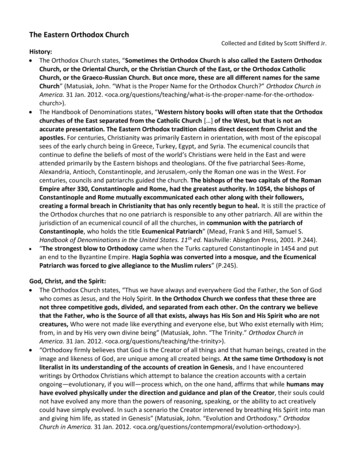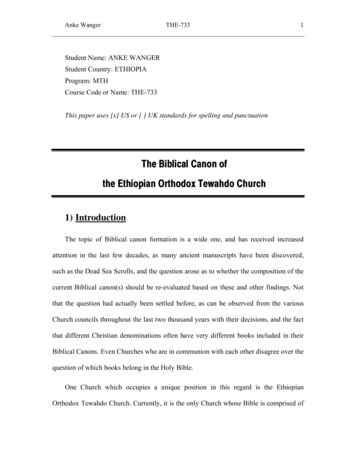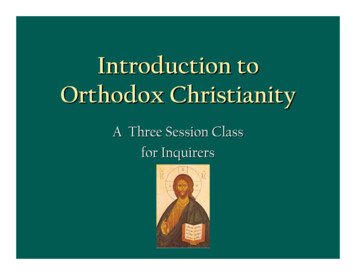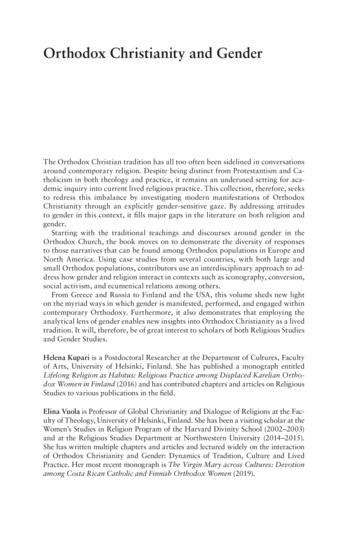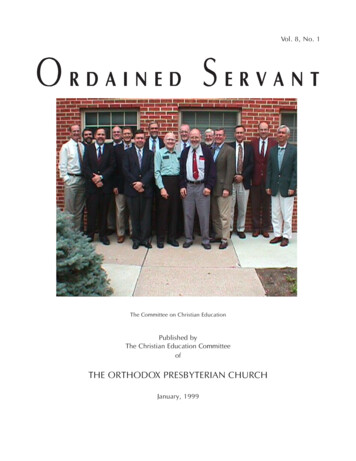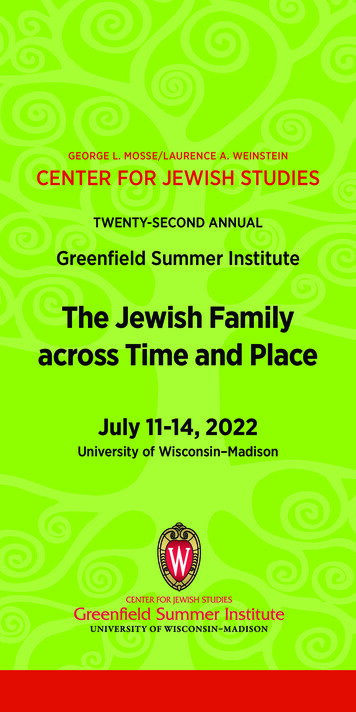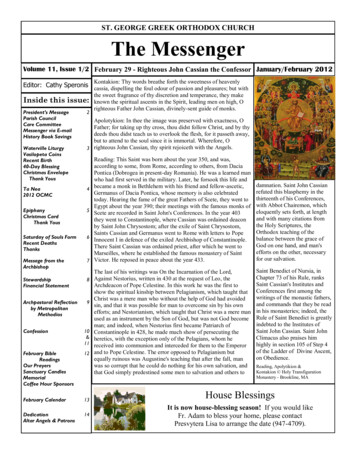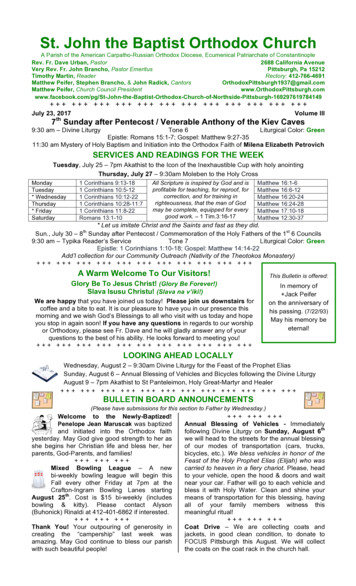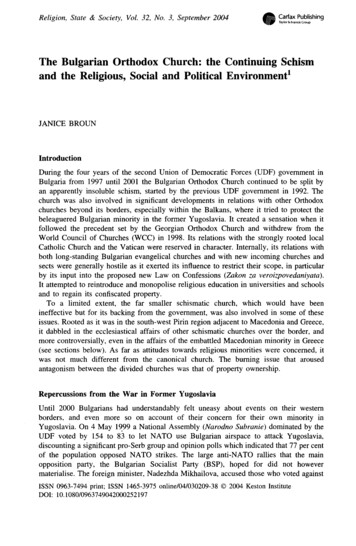
Transcription
Religion, State & Society, Vo!. 32, No. 3, September 2004 11/'Carfax PublishingTaylor 6. Francis GroupThe Bulgarian Orthodox Church: the Continuing Schismand the Religious, Social and Political EnvironmentlJANICE BROUNIntroductionDuring the four years of the second Union of Democratic Forces (UDF) government inBulgaria from 1997 until 2001 the Bulgarian Orthodox Church continued to be split byan apparently insoluble schism, started by the previous UDF government in 1992. Thechurch was also involved in significant developments in relations with other Orthodoxchurches beyond its borders, especially within the Balkans, where it tried to protect thebeleaguered Bulgarian minority in the former Yugoslavia. It created a sensation when itfollowed the precedent set by the Georgian Orthodox Church and withdrew from theWorld Council of Churches (WCC) in 1998. Its relations with the strongly rooted localCatholic Church and the Vatican were reserved in character. Internally, its relations withboth long-standing Bulgarian evangelical churches and with new incoming churches andsects were generally hostile as it exerted its influence to restrict their scope, in particularby its input into the proposed new Law on Confessions (Zakon za veroizpovedaniyata).It attempted to reintroduce and monopolise religious education in universities and schoolsand to regain its confiscated property.To a limited extent, the far smaller schismatic church, which would have beenineffective but for its backing from the government, was also involved in some of theseissues. Rooted as it was in the south-west Pirin region adjacent to Macedonia and Greece,it dabbled in the ecclesiastical affairs of other schismatic churches over the border, andmore controversially, even in the affairs of the embattled Macedonian minority in Greece(see sections below). As far as attitudes towards religious minorities were concerned, itwas not much different from the canonical church. The burning issue that arousedantagonism between the divided churches was that of property ownership.Repercussions from the War in Former YugoslaviaUntil 2000 Bulgarians had understandably felt uneasy about events on their westernborders, and even more so on account of their concern for their own minority inYugoslavia. On 4 May 1 99 a National Assembly (Narodno Subranie) dominated by theUDF voted by 154 to 83 to let NATO use Bulgarian airspace to attack Yugoslavia,discounting a significant pro-Serb group and opinion polls which indicated that 77 per centof the population opposed NATO strikes. The large anti-NATO rallies that the mainopposition party, the Bulgarian Socialist Party (BSP), hoped for did not howevermaterialise. The foreign minister, Nadezhda Mikhailova, accused those who voted againstISSN 0963-7494 print; ISSN 1465-3975 online/04/030209-38 2004 Keston InstituteDOl: 10.108010963749042000252197
210Janice Brounof silent complicity in Serbia's continuing violence against its own citizens, and of votingto prolong the conflict and prevent a united Europe (Lebor, 1999). The main reason forthe government's stance was obviously to provide an irrefutable reason for hasteningBulgarian integration into the European Union (EU).The spokesman for the schismatic church Kamen Barakov truculently accused Maksimof trying to rally support for Slobodan Milosevi6 - unjustifiably, given the reserved natureof Maksim's statements, which were in line with those of other moderating Orthodoxleaders and in sharp contrast with Moscow Patriarch Aleksi' s defence of Serbia andcondemnation of NATO bombing. Here was proof that Maksim and the Bulgarian HolySynod - despite a majority of pro-Russian metropolitans - were not totally in the MoscowPatriarchate's pocket. In a message read out in all churches they appealed to leaders onboth sides for a non-violent solution, demanding an immediate end to NATO air strikesand the murderous conflict. Prayers were needed for all victims, Serbian and Albanianalike. Nevertheless they unequivocally condemned Milosevi6's policies as an 'insult' toOrthodoxy: 'It is not possible for war and slaughter like these to be fomented andperpetrated in the name of Christianity' (SOP, 1999b, p. 8). The Holy Synod's spokesmanMarin Varbanov stressed that inter-Orthodox solidarity could not condone MiloseviC'scrimes and described his policies as vicious, serving only to increase tensions betweenSerbia, Macedonia, Bulgaria and Albania. 'We are particularly sensitive here in theBalkans to the Serbian government's attitude towards its own citizens of Albanian origin',he pointed out, regretting its failure to pay heed to prophetic voices like that of SerbianPatriarch Pavle. Orthodox primates had not expressed unconditional support for Serbiaand had no intention of following any ideological slogan blindly (SOP, 1999a, p. 16).The Bulgarian Minority in SerbiaInevitably, Bulgarian support for NATO rendered the status of the 25,000 Bulgarianminority around Tsaribrod and Bosilegrad in the neglected and backward ZapadniPokrainini border region of south-east Serbia even more precarious (Broun, 2000, p. 279).Once numbering around 125,000, it had been subject to every kind of pressure andattempts at assimilation, and by 1997 barely survived, according to Zdenka Todorova,chairperson of the Helsinki Committee of Bulgarians in Yugoslavia. She accused the Serbgovernment of systematically running down its agriculture in order to depopulate theborder zone. The impoverished community's birth rate had plummeted. Many villageslacked electricity, telephones, roads and communications of any kind. 'The anxietypsychosis suffered by the population . is mirrored in their fear of the authorities, thepolice, the border, unemployment and the socio-economic crisis', Todorova wrote. Highcustoms duties prevented people from crossing the border to visit friends and relatives inBulgaria. The closeness of the Bulgarian and Serbian languages, cultures and religionmeant that some of the community had opted for assimilation as the easiest way out. Until1974 there had been proper provision in schools for the Bulgarian majority living there,but Bulgarian was now studied for only two hours a week. Only the feast day of St Savawas commemorated; St Cyril and St Methodius were entirely ignored. The media werecompletely under the control of the state and Milosevi6's Socialist Party; the Bulgarianswere the only minority in Serbia without media in their own language (Todorova, 1997,pp. 5-7). There had been local protests against forced conscription, and the secretary ofthe Democratic Union of Bulgarians had been imprisoned for a short time for leaving hismilitary unit. Bulgarian government lorries bearing much-needed humanitarian aid for thecommunity and for a Belgrade hospital were refused entry. The beleaguered communitywas patently in need of spiritual and pastoral care. Three years earlier, during Patriarch
The Bulgarian Orthodox Church211Maksim's visit to Serbia, Patriarch Pavle had agreed to provide for the appointment ofBulgarian priests and for Bulgarian liturgy - for liturgies are served only on feast days andthen in Serbian - but nothing had changed. Todorova told Radio Free Europe of a Serbianbishop's refusal to ordain two Bulgarians as priests, and that the Committee planned tocomplain to The Hague on the position of their minority (Standart, 1999c). Refusal toordain priests who have no impediments represents a serious breach of canon law.Although provision was made for two Bulgarian priests to be sent to these communities,nothing materialised. Local Bulgarians decided to file a suit against the Serbian OrthodoxChurch because of its role in promoting measures to suppress their nationality (Demokratsiya, 1999a). Archimandrite Sioni, the rector of Sofia Seminary, insisted during his visitto Moscow that the Russian patriarch approach the Serbian Orthodox Church to ensurethat two Bulgarian priests could be sent to Zapadni Pokrainini (Demokratsiya, 1999b).Demokratsiya, the UDF mouthpiece, which was almost always hostile to the patriarch,claimed that Maksim's Synod had been uneasy about this, saying that there were nopriests willing to serve in such a backward region, but members of the pro-schismaticPriests' Union had countered that provided the Serb authorities were prepared to allowpriests in to serve there, patriots would come forward. Was this a case of bravado?Subsequently the matter was played down, probably because of the increasingly isolatedSerb authorities' desire to keep the issue low-key. Whether there would be muchimprovement under the subsequent Serbian government remained to be seen.The Ramifications of the Schism in other Balkan Churches: Macedonia, Montenegroand IstanbulSince canonical Orthodox churches cold-shouldered them, Metropolitan Pimen ofNevrokop, head of the schismatic synod until his death in 1998, and his supporters, couldestablish connections only with breakaway Orthodox churches. Metropolitan Filaret, headof the Russian Orthodox Church - Kiev Patriarch ate in Ukraine, graced Pimen'suncanonical council (subor) with his presence in 1996. This led to speculations about theemergence of a second Orthodox centre as separatist churches came closer together in ajoint front against recognised local churches (Kontinent, 1998, quoted in Raikin, 1998,p. 230, note 66). They would be under the aegis of Filaret, who envisaged creating by themillennium a parallel Orthodox jurisdiction, which Georges Tsetsis, Ecumenical Patriarchate representative in Geneva, dubbed a 'schismatic internationale', with alternativemetropolitanates and autonomous bishoprics in every Orthodox country. To this endFilaret had taken under his wing several breakaway factions from the Orthodox diasporain Western Europe and the USA, bestowing grandiose titles on various bishops of doubtfulprovenance and on defrocked priests. He had established relations with Old Calendaristsin Greece, Bulgaria and Romania, which are relatively stable and undoubtedly devoutcommunities, though some of their leadership is ill advised, according to mainstreamOrthodox observers. He naturally forged links with the schismatic Bulgarian church, theautocephalous Macedonian church and the Georgian Orthodox Church, which left theWCC in 1997. To further this policy, Metropolitan Danylo of the Kiev Patriarch atecelebrated a liturgy in a schismatic church in Silistra in June 1998. Tsetsis admitted thathe feared possible long-term effects of Filaret's expansionist policy on traditionalistOrthodox Eastern- bloc countries whose people had suffered systematic brainwashing anddisinformation. He maintained that it was imperative to expose and condemn suchpara-church groups by countering them with sound theological, ecclesiastical and canonical arguments. People needed to be warned about the uncanonical nature, antecedents andethos of pseudo-bishops who on the pretext of defending the true faith and Orthodox
212Janice Brountradition were exploiting popular piety and credulity, tarnishing the image of Orthodoxyamong other Christian confessions and mounting a counter-witness to genuine Orthodoxy(Tsetsis, 1999, pp. 17-18).Ecumenical Patriarch Bartho1omaios and Patriarch A1eksi of Moscow denouncedschismatic churches at Odes sa on 24 September 1997 (SOP, 1997, pp. 5-6). However, inOctober an Orthodox Balkan summit in Salonika appeared to give the green light for fullautocephaly for churches eventually, provided their nations were properly recognised asindependent.MacedoniaThis decision was relevant in the case of Macedonia since it had been, belatedly,recognised (under the name 'Former Yugoslav Republic of Macedonia') by the Greekgovernment in 1995 and by the rump Yugoslavia in 1996. Since its politically motivatedcreation under Tito in 1967 the Macedonian Orthodox Church, with 1.2 million members,had become the de facto Orthodox Church in the republic, representing 60-70 per cent ofthe population, with practically only the small Serb minority dissenting. PatriarchBartolomaios said he was in favour of granting it canonical autocephaly, provided itsmother church, the Serbian Orthodox Church, agreed (G2W, 1997, p. 8). At an international colloquium on Orthodoxy in Athens in September 1999 Patriarch Ignatius ofAntioch referred to lack of progress in establishing relations between local Orthodoxchurches and Old Calendarists in Greece, Bulgaria and Romania as well as efforts throughthe Sofia summit to resolve the major Bulgarian schism (SOP, 1999f).Pimen, whose metropolitanate bordered long-disputed territory in the grey zone alongBulgaria's southern frontier, even dabbled in parishes across the Greek border. With thecollapse of the Ottoman Empire in the nineteenth century Macedonia, in its broadestsense, had become an ecclesiastical battleground between Greeks, Serbs, Bulgarians and,after 1925, Albanians, each church founding schools to promote their respective languagesand cultures as a back-up to claims to the disputed territory.Essentially Slav Macedonians are Bulgarians, and the dialect they speak is closer toBulgarian than Serbian. Nevertheless, during the Bulgarian takeover of Vardar and PirinMacedonia in 1942 the insensitive behaviour of Bulgarian bureaucrats and the reimposedBulgarian Orthodox bishop dampened the widespread pro-Bulgarian sentiment among themajority of the Slav population there (Poulton, 2000, pp. 101-2, 118, 162-71). However,in the aftermath of the civil war in Greece the Greek government's extremely repressivepolicies, including enforced assimilation policies and population transfers, effectivelyhellenised Greek Macedonia. The Macedonian minority there, estimated by outsideobservers as between 150,000 and 200,000, is not recognised by the Greek government,but accepts its status and prefers to live quietly in Greece rather than attempt to unite withpoverty-stricken Bulgaria or Macedonia.Since 1989 demands that Greece recognise that Macedonians exist who are not Greekfrom an ethnic or a religious point of view have surfaced in the 'Rainbow Movement'which includes some slavophone priests who focus on restoration of a MacedonianChurch, recognition of the Macedonian language and bilingual signs rather than fullminority rights and who actively supported Pimen. One, Nikodim Carknija, had beenunder pressure from his own church since the 1980s, having even been briefly dismissedfrom the church in 1981 for speaking out against the notoriously nationalist Greek bishopof Florina, where visitors find that the atmosphere is tense and people unusuallyuncommunicative. 2 Carknija was dismissed again in 1990 but reinstated in 1996. As priestof the village of Sveti Afanasi Fr Carknija prayed for Pimen during his Slav liturgy and
The Bulgarian Orthodox Church213used the old name of the diocese, 'Moglena', until the local police intervened. He wasforced to give up and move into Macedonia to carry on his ministry without harassment. 3(Gstrein, 1997; Poulton, 2000, p. 171).Pimen had supported the Macedonian Orthodox Church and three schismatic priestsconcelebrated in Skopje cathedral at Easter 1998. In the same year the MacedonianOrthodox church leadership mounted a fruitless campaign for the return of the archbishopof Okhrid's crown from the Bulgarian National History Museum, arguing that thearchbishopric had never been Bulgarian. However, after the declaration of cooperationbetween Prime Minister Ivan Kostov and his Macedonian counterpart Ljubco Georgievskion 22 February 1999 had put the hitherto strained relations between the two countries ona new footing, hobnobbing with Macedonians was no longer confined to the schismatics.In May Metropolitan Neofit of Dorostol-Cherven and Bishop loan, abbot of Rilamonastery, accompanied Kostov to the shrine in the crypt of Saints Cyril and Methodiusin San Clemente in Rome, the traditional centre for Bulgarian pilgrims. Kostov andGeorgievski laid wreaths there together, in the company of Macedonian metropolitansTimofei and Stefan, who pleaded for parts of the relics of St Cyril (Standart, 1999a).After the death of octogenarian Macedonian Archbishop Mikhail in July 1999, predictably no representatives of local Orthodox churches were present at the enthronementof his successor, Metropolitan Stefan (Stojan Veljanovski) in Okhrid on 10 October, buttwo schismatic metropolitans were; possibly emboldened by Bulgarian governmentrecognition of Macedonia on 19 September 1999 and building on friendly contacts madein San Clemente, Neofit and Metropolitan Kalinik of Vratsa broke new and controversialground by concelebrating a liturgy in Vratsa with Macedonian metropolitans Petar andTimofei and Bishop Jovan. When challenged on Bulgarian television Neofit claimed thatthis did not imply any recognition of Macedonian autocephaly by his church. Maksim,obviously annoyed, declared the Vratsa liturgy anti-canonical and stated that he wouldhave opposed it had he known about it. His office quashed Macedonian press reports thatthe Holy Synod, discussing the issue, had recognised the autocephaly of the MacedonianOrthodox Church. The concelebration was also strongly condemned by Bartholomaios,who held that the Macedonian Church should have referred to him to define its status.Further confusion ensued the following summer when Metropolitan Stefan denied thatthe Bulgarian state and church had ever had any presence in the region; but he alsoconceded that Maksim was the only Orthodox patriarch who interceded with theecumenical patriarch for the recognition of the Macedonian Church, thus contradictingpress reports that the Holy Synod thought that recognition should come first from theSerbian 'mother' church. Standart, which covered the issue, commented that Stefan'sstatement might put a stop to the Holy Synod's shuttle diplomacy (Standart, 1999b).As ecclesiastically illiterate Macedonian politicians started to manipulate disputants inthe schism for their own ends there were unbecoming disruptive scenes in Macedonia onChristmas Eve 1999 reminiscent of the early days of the schism. Although the disputewith the Serbian Orthodox Church rumbled on and in 2002 a Macedonian bishop, Jovanof Veles and Povardarje, who had very friendly relations with the Greek Church, brokeranks and decided to accept the authority of Serbian Orthodox patriarch Pavle, closeBulgarian involvement in Macedonian affairs ceased (Bojarovski, 2002, pp. 13-14).The Situation of the Macedonian Minority within Bulgaria and its Ecclesiastical RepercussionsFurther complications were caused by the presence of a Macedonian minority withinBulgaria itself. No recent census figures are available; the last possibly reliable one is187,789 in 1956! (Poulton, 2000, p. 148). Although most live in the south-west Pirin
214Janice Brounregion there are also groups in many cities, especially Sofia, where huge numbers ofMacedonians fled after the failure of the Ilinden rising against Ottoman domination in1903. Under Todor Zhivkov's one-nation policy, their existence was denied (as was thatof the Turks and Pomaks). Even with the advent of democracy they were still regardedas a Yugoslav 'Trojan Horse', prey to possible annexation first by Serbia and then by thenew independent state of Macedonia. The February 1990 coalition government maintainedthat there was no Macedonian question since all Macedonians were Bulgarians. Althoughthis posed no problem for the majority of Macedonians who espoused Macedonianconsciousness as part of a wider Bulgarian one, it did pose one for nationalist separatistorganisations which were at first persecuted and only gradually earned acceptance aspolitical parties. The controversial and widely opposed United Macedonian Organisation(Obedinena Makedonska Organizatsiya - Ilinden), named 'Ilinden' after the uprising,represented the moderate wing of the Bulgarian Macedonians. Its charter in 1990 statedthat it would not attempt to violate Bulgaria's national integrity and would upholdfreedom for all religions. It was ruled a constitutional political party in August 1999.However, it had its extremist wing under Iordan Kostadinov, among whose demands forfulfilment of separatist claims was autocephaly for the Orthodox Church in PirinMacedonia. According to Bulgarian observers, Kostadinov's real aim was not justseparation but unification with the Okhrid Patriarch ate (Poulton, 2000, pp. 152-7). PirinMacedonia was a stronghold of the schismatics, though they lost considerable groundthere during 1999. In a complex case the Sofia Appellate Court ruled on 28 April thatbecause Ilinden was conducting religious and religious-educational activities it needed toask for permission from the government under Article 133A of the Persons and FamilyAct (Zakon za litsata i semeistvoto). This decision was confirmed by the Supreme Courton 12 October (BHC Report, 2000, pp. 9-10). This decision implied the emergence of yetanother schismatic Orthodox Church in Bulgaria, though Ilinden is a small organisationwith not much more than 1000 members and its church was probably still a theoreticalconstruct. 4 Its peaceful assemblies, including its annual gatherings at Rozhen Monasteryto commemorate the death of its hero lane Sandanski were broken up by police until 22April 2001, when Ilinden members were at last granted a permit and managed to celebratethe anniversary without being stopped by police. However, the two priests invited werenot allowed to conduct the memorial service and amplifiers were banned, while Trud and24 Chasa printed allegations that the Macedonians wanted to see Bulgarians dead.Alarmed, Ilinden carried its protests to the European Court of Human Rights (Obektiv,2001b, p.2).Since the other leading Macedonian party (with 56 branches scattered throughout thecountry), the Internal Macedonian Revolutionary Organisation (IMRO) (Vatreshna Makedonska Revolyutsionna Organizastiya (VMRO», has as its main objective counteringpan-Serbian and pan-Greek ambitions at the expense of the Macedonian Bulgarians, it hasbeen more acceptable to recent Bulgarian governments; its Assembly members evenjoined the UDF coalition. Most members are descended from Macedonian refugees toBulgaria and are extremely hostile to Ilinden and to organisations they rate as non-Bulgarian (Poulton, 2000, pp. 160-2). From the standpoint of religious freedom IMRO hasplayed a very negative role, at both national and local levels. As we shall see later, IMROmembers are often the chief instigators of discriminatory legislation against religiousminorities and even of violence. IMRO's draft for the proposed new Law on Confessionswas the most restrictive and IMRO played a key role in trying to enforce draconian andillegal restrictions on minority denominations in municipalities (see the sections below onreligious minorities and the draft law).
The Bulgarian Orthodox Church215MontenegroThe schismatics were also involved in the far smaller-scale schism in Montenegro, whichhad begun in 1993. On 15 March 1998 in St Paraskeva, Sofia, Pimen and seven bishops,assisted by four priests, consecrated as a bishop its leader, the self-proclaimed metropolitan Mihailo (Dedeic), a priest with a chequered background, including suspension by theOrthodox Church of America. In an official statement the self-styled MontenegrinOrthodox Church claimed that Pimen was patriarch, that the consecration was supportedby the Synod of the Bulgarian Orthodox Church, and that these facts provided the legalbasis for Mihailo's episcopal status (Bjelajac, 2000a). After May 1998 the attempt by thenew Montenegrin government under Milo Djukanovic to wrest the small republic fromBelgrade's grip provided extra motivation for the breakaway church group to follow suit,though the government represented only just over half of the Montenegrin population andMetropolitan Amfilohije claimed he had all but three of its 650 parishes firmly underSerbian Orthodox control (SOP, 1999c, p.20). Mihailo considered his church autocephalous and a successor to the Macedonian Church, which was absorbed by the SerbianPatriarchate in 1920. In 2000 he had 11 priests but claimed that 30 more were interested(Corley, 2000). At Easter the Montenegrin situation was for a time potentially explosiveand the schismatics steered clear of trying to forge closer links with Mihailo. The demiseof Pimen may also have contributed to a lessening of schismatic interest over the borders.IstanbulAccording to agreements reached in 1945 the Bulgarian church in Istanbul comes withinthe jurisdiction of the Ecumenical Patriarchate. However, Pimen put feelers out even thereand obtained the support both of the priest of the Bulgarian 'Iron' church, KonstantinKostov, and of his parish president, Bozhidar Chipov, who went as far as to denounce themetropolitan of Laodicea (who has jurisdiction over the part of Istanbul in which thechurch is located) to the Turkish authorities on the grounds that he infringed their religiousliberties by attending their Easter vigil in 1996. As a result the unfortunate metropolitanwas sentenced to five months in prison, unconditionally, though a protracted appeal savedhim from serving his term. By 1997 the parish was clearly split between adherents ofMaksim and Pimen. 5 The head of the Board for Religious Affairs, Lyubomir Mladenov,visited Istanbul for discussions with Bartholomaios in January 1999, during which thepatriarch stressed that he had no wish to hellenise Bulgarians. Bartholomaios advisedMaksim to leave the parish in his hands but insisted his name be mentioned during theliturgy. He promised that it would start functioning again for occasional services and thathe would ensure the restoration of the Bulgarian church in Adrianople. Unfortunately, theparish issue remained unresolved as a result of pressure from an ultranationalist groupwithin the congregation, which was not attached to either synod but was later, in 2003,to attempt to arraign the ecumenical patriarch himself.The Bulgarian Orthodox Church Leaves the WCCOrthodox churches that were increasingly uneasy about the WCe's theology, and whatthey regarded as other member churches' overall lack of understanding of the Orthodoxtheological standpoint, held a consultation at Thessalonika under Bartholomaios from 29April to 3 May 1998, primarily to discuss their policy towards the forthcoming WCCGeneral Assembly at Harare (Zimbabwe) in December. The Georgian Orthodox Churchhad already withdrawn in May the previous year and on 9 April the Holy Synod decided
216Janice Brounthat the Bulgarian Orthodox Church would follow suit, though it sent two representativesto Thessalonika (Trud, 1998). Its action almost certainly reflected the opinion of themajority of its members, who, although they might have had cordial relationships withmembers of other traditional religious communities in their home country, Muslimsincluded, had barely been exposed to the new climate of acceptance of pluralism amongreligions. The abruptness of the decision to withdraw gave the pan-Orthodox consultationyet another topic for its agenda.There was a suspiciously long delay, six weeks, before an official announcementappeared in Tsurkoven vestnik on 1 June, along with the text from the Bishops Council,dated 27 May (Stricker, 1998, p. 5). This read:Although the Orthodox Church has participated in the eucumenical movementfor a century and has belonged to the WCC for half a century, there has beenno satisfactory advance in multilateral theological dialogue between Christians.Just the opposite; the gulf between Orthodox and Protestants has become evenwider, because dozens of new sects have proliferated within the Protestantchurches. These confuse people's understanding of Orthodoxy, not only herebut in all other Orthodox lands. The WCC has diverged considerably from itsoriginal aims. On these grounds the Holy Synod, with the full agreement of itsmembers, decided on 9 April to withdraw from the WCe. Other reasons behindour decision . [include the fact that] in recent years our church has not madeany significant contribution to the work of the WCC nor taken part in manyconferences, and in fact has more or less cancelled its membership.Their representative would formally inform the WCC of this decision at Harare inDecember. A communique from the Diocese of Western and Central Europe even wentso far as to accuse the established Protestant churches of providing shelter for sects.This irregular procedure and the delay in publishing a formal announcement promptedGerd Stricker, head of research at Glaube in der Zweiten Welt, to wonder what game theBulgarian Orthodox Church was playing. Was it using this threat as a sort of blackmail?Disputes within the church played a significant role in the Georgian Church's withdrawal.The split within the Bulgarian Church went far deeper; the schism had gone on for nearlyhalf a decade, with for the last two years even a rival patriarch. Moreover, the schismaticSynod had not broken apart but had stabilised and even gained support. Stricker reckonedthat the Holy Synod might have calculated that it could win new sympathisers andstrengthen its position vis-a-vis the schismatics by tapping into public hostility to theWCe.The Holy Synod confirmed its decision on 22 July, but a spokesman emphasised thatthe church had no intention of severing its eucumenical contacts built up with otherChristian organisations. Georges Tsetsis, the ecumenical patriarch's representative inGeneva, pointed out that the Bulgarian Church's reasons (pr quitting the WCC contradicted the positive attitude of the final Thessalonika document regarding WCC concern forOrthodox interests (SOP, 1998d, pp. 6-7).Not all sections of the church welcomed the withdrawal. Significantly, 15 parishes anda monastery abroad, with experience of ecumenism at the local level, voiced theirdisapproval at the General Assembly of the Diocese of Central and Eastern Europe inParis on 2--4 October. Delegates pointed ou
Religion, State & Society, Vo!. 32, No. 3, September 2004 Carfax Publishing 11/' Taylor 6. Francis Group The Bulgarian Orthodox Church: the Continuing Schism and the Religious, Social and Political Environmentl JANICE BROUN


